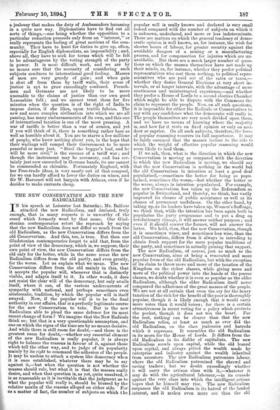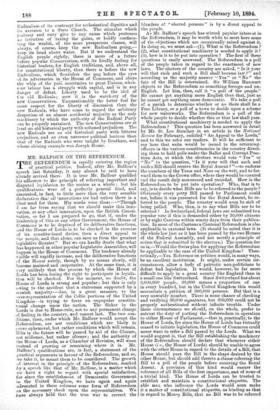THE NEW CONSERVATISM AND THE NEW RADICALISM.
IN his speech at Leicester last Saturday, Mr. Balfour attacked the new .Radicalism, and declared, truly enough, that in many respects it is unworthy of the creed which formerly went by that name. Our Glad- stonian contemporaries retort the reproach by saying that the new Radicalism does not differ so much from the old Radicalism, as the new Conservatism differs from the old Conservatism. And this, too, is true. But then our Gladstonian contemporaries forget to add that, from the point of view of the democracy, which is, we suppose, their own point of view, the new Conservatism differs from the old only for the better, while in the same sense the new Radicalism differs from the old partly, and even greatly, for the worse. Let us explain what we mean. The new Conservatism differs from the old mainly in this, that it accepts the popular will, whenever that is distinctly visible, and adapts itself to it. In other words, it does not resist the clear will of the democracy, but only avails itself, where it can, of the various undercurrents of sympathy with national, and perhaps sometimes even aristocratic, tradition, by which the popular will is itself swayed. Now, if the popular will is to be the final authority in our affairs, that is a perfectly legitimate course for the new Conservatism to take. But is the new Radicalism able to plead the same defence for its most recent change of form ? We imagine that the New Radicals think so ; but that is a very questionable assumption, and one on which the signs of the time are by no means decisive. And while there is still room for doubt,—and there is the greatest room for doubt,—whether any essential element of the new Radicalism is really popular, it is always right to balance the reasons in favour of it, against those which tell the other way, and to judge of its popularity mainly by its right to command the adhesion of the people. It may be useless to attack a system like democracy when it is once established, whatever there may be to say against it,—but when the question is not whether the masses should rule, but what it is that the masses really desire, and when that question is, as yet, quite unsolved, it is as reasonable as it is inevitable that the judgment as to what the popular will really is should be biassed by the relative merits of the reasons alleged on either side. For as a matter of fact, the number of Erubjects on which the popular will is really known and declared is very small indeed compared with the number of subjects on which it is unknown, undeclared, and more or less indeterminate. There are matters on which the general tendency of demo- cratic opinion is well known, as, for instance, the wish for shorter hours of labour, for greater security against the avoidable dangers of a mining or a manufacturing process, and for compensation for injuries which are un- avoidable. But there are a much larger number of ques- tions on which the masses themselves have not made up their minds, as, for instance, whether they prefer political representatives who cost them nothing, to political repre- sentatives who are paid out of the rates or taxes,— whether they desire General Elections at very short in- tervals, or at longer intervals, with the advantage of more continuous and uninterrupted experience,—and whether they prefer a House of Lords to a second elective Chamber which might be able to dispute with the Commons the claim to represent the people. Now, on all such questions, it is impossible for either the Radicals or Conservatives to say with any confidence what the democratic will really is. The people themselves are very much divided upon them, and we have no means of knowing where the majority is, and how far it rests on fixed opinion or only on acci- dent or caprice. On all such subjects, therefore, the force of popular reasoning recovers its full importance. It may be fairly assumed that the masses incline to the side to which the weight of effective popular reasoning would seem likely to lead them.
If we ask, then, what is the direction in which the new Conservatism is moving as compared with the direction in which the new Radicalism is moving, we should say that the new Conservatism is nothing in the world but the old Conservatism in intention at least a good deal popularised,—sometimes the better for being so popu- larised, sometimes the worse,—but whether the better or the worse, always in intention popularised. For example, the new Conservatism has taken up the Referendum so popular in Switzerland, and thereby, we think, has vastly improved its chance of public acceptance as well as its chance of permanent usefulness. On the other hand, by taking up, as its leaders have taken up, Women's Suffrage, we think that, while the intention has been again both to popularise the party programme and to put a drag on revolutionary change, it will answer neither purpose ; and even if it should answer the former, will not answer the latter. We hold, then, that the new Conservatism, though it is sometimes wiser, and sometimes less wise, than the old Conservatism, differs from it always in intending to obtain fresh support for the more popular traditions of the party, and sometimes in actually gaining that support.
The new Radicalism, of course, just as much as the new Conservatism, aims at being a renovated and more popular form of the old Radicalism, but with the exception of its claim to throw more and more of the taxation of the Kingdom on the richer classes, while giving more and more of the political power into the hands of the poorer classes, we doubt whether it is even so popular as the older Radicalism, although the older Radicalism itself never conquered the adherence of the great masses of the people. We are not at all certain that even the cry for the heavy taxation of the rich for the benefit of the poor is thoroughly popular, though it is likely enough that it would carry more votes than it would voices ; for there is a certain attractiveness in secret voting for a policy which protects the pocket, though it does not win the heart. For the rest, nothing can be clearer than that the new Radicalism relies, at least as much as ever did the old Radicalism, on the class jealousies and hatreds which it expresses. It resembles the old Radicalism in its scorn for the House of Lords. It differs from the old Radicalism in its dislike of capitalists. The new Radicalism scowls upon capital, while the old leaned upon capital, and always pitted the wealth made by enterprise and industry against the wealth inherited from ancestors. The new Radicalism patronises labour. where the old Radicalism patronised the shrewd and saving traders ; but we doubt exceedingly whether it will carry the artisan class with it,—whatever it may do with the agricultural labourer,—in its crusade against the very class into which the intelligent artisan hopes that he himself may rise. The new Radicalism surpasses the old Radicalism in its hatred of the landed interest, and it males even more use than the old Radicalism of its contempt for ecclesiastical dignities and its aversion to a State Church. The stimulus which jealousy and envy give to any cause which professes an intention of taxing the gains, or boldly confisca- ting the wealth, of the more prosperous classes, will always, of course, keep the new Radicalism going,— keep its head above water. But if we understand the English people rightly, there is more of a future before popular Conservatism, with its kindly feeling for historical leaders, for English traditions, and, above all, for constitutional liberty, than there is before the new Radicalism, which flourishes the gag before the eyes of its adversaries in the House of Commons, and obeys the whip of the paid secretaries to great Unions, when- ever labour has a struggle with capital, and is in any danger of defeat. Liberty used to be the idol of fie old Radicals ; now it is the watch-cry of the new Conservatives. Unquestionably the latter feel far more respect for the liberty of discussion than the new Radicals, who have come to regard the arbitrary despotism of an almost accidental majority as the only machinery by which the authority of the Radical Party van be properly sustained. The new Conservatives are at least an old historical party with softened prejudices. The new Radicals are an old historical party with bitterer prejudices, and an even narrower political horizon than that of the Radicals who were taught by Bentham, and whose shining example was Joseph Hume.







































 Previous page
Previous page